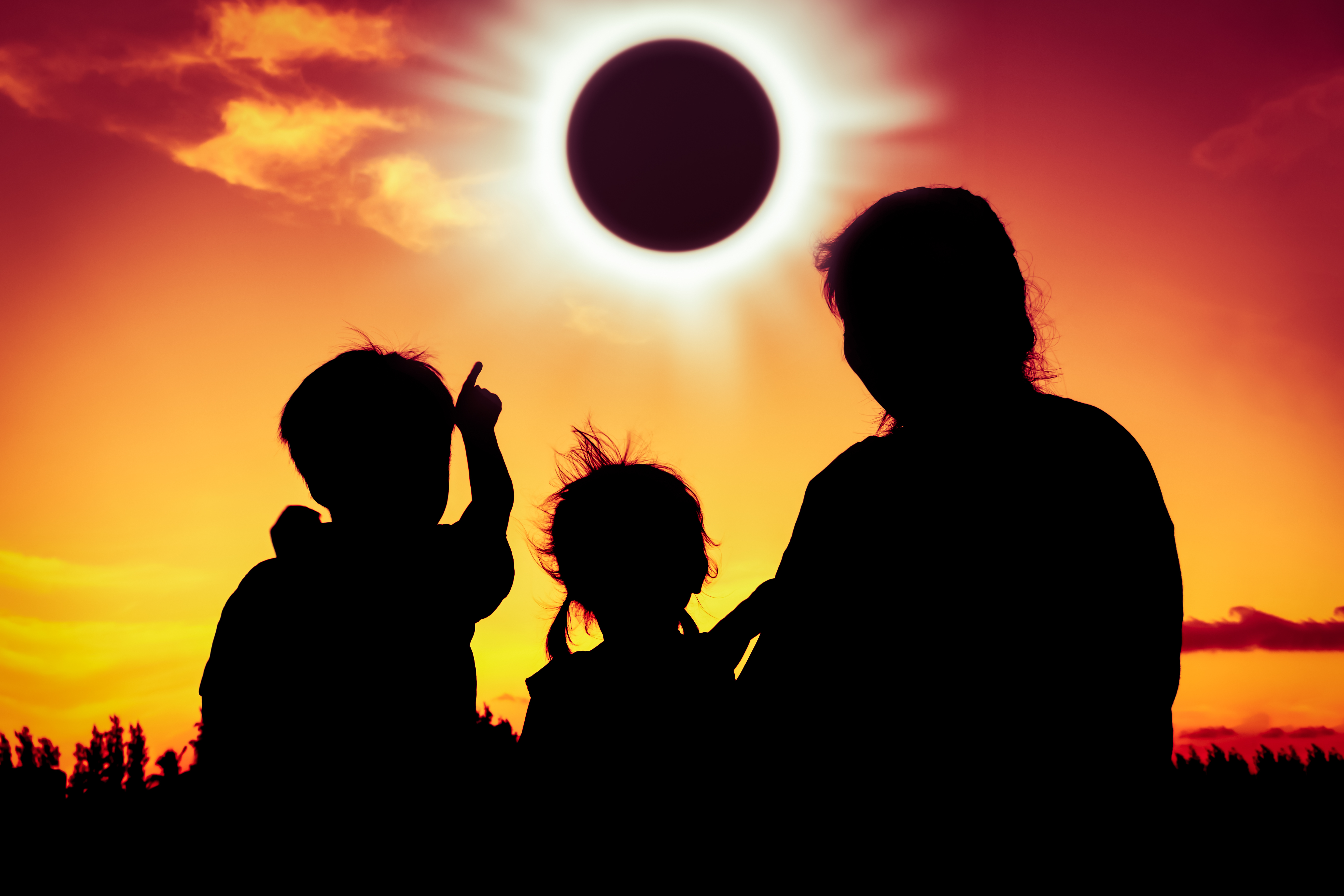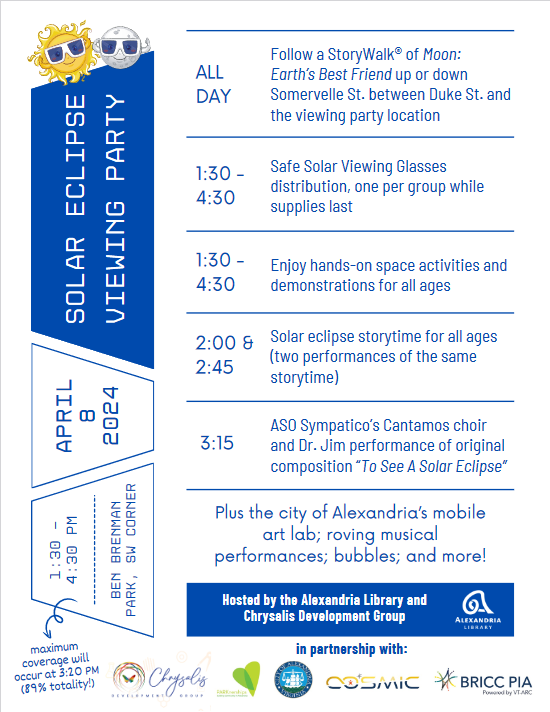Hello neighbors! I am a NASA scientist (an astrobiologist) and have lived in Cameron Station with my family since 2016. I wanted to share with you about an upcoming event!
I hear that a total solar eclipse is an amazing thing and a surreal experience. I am hopeful that on April 8, 2024, if the weather cooperates, I will get to experience this phenomenon for 3 minutes and 38 seconds. I will be packing up my family and heading to my in-laws in Ohio – directly in the path of totality, albeit with a 50-50 forecast of cloud cover obscuring our view.
Here in Alexandria, VA, while the Moon will not completely obscure the Sun, it will cover 87%. Locally, the eclipse will start at 2:04pm and end at 4:32pm. You can see a map of the eclipse, including when and where the event can be viewed, on NASA’s site by clicking HERE.
Solar eclipses happen when the Sun, Moon, and Earth line up perfectly in a way that the Moon casts a shadow on Earth. Total solar eclipses happen when the Moon is far enough away from the Earth that it fully covers the Sun and is a rare opportunity to view in any particular place – for example the next total solar eclipse after 2024’s event in the contiguous U.S. won’t be until 2044. Some people chase total solar eclipses and travel the world to view them 2-5 times per year as they occur.
A total solar eclipse is uniquely an experience here on Earth. Out of all the planet and moon systems in our Solar System, ours is the only one where the apparent size of the moon and Sun are close to create the effect where the Sun is obscured yet you can still see it’s corona (outer most part of the Sun’s atmosphere). Eclipses happen on other planets, and there are some amazing images of the recent eclipse on Mars by its moon, Phobos (You can see those by clicking HERE). And this experience is one that exists only for a finite period of Earth’s timeline as the Moon continues to move further away from Earth. Eventually, in about 600 million years, the Earth will experience its final total solar eclipse when the Moon is no longer close enough to block out the Sun completely. That’s about the same amount of time between when we see the earliest known assemblage of complex life on Earth—which occurred in the Ediacaran period—to life on Earth today. That’s a pretty long time!
When viewing the eclipse, safety is of utmost importance. Except for viewing totality, when the Sun is 100% (not 99%) covered by the Moon, your eyes can be damaged by looking at the Sun. It is important to wear eclipse glasses that are certified ISO 12312-2 standard or to observe the eclipse indirectly. Make sure you inspect your eclipse glasses for any damage and only get them from reputable sources. You can check eclipse glasses to make sure they are safe by finding a bright light (not the Sun!), holding your eclipse glasses up to the light, and looking through them. If the light appears extremely dim or does not appear at all, your eclipse glasses are safe to use for viewing the event. You can see more tips for viewing the eclipse safely by clicking HERE.
There will be some partial eclipse viewing events nearby. If you want to try and make it to a location that will experience totality, I suggest you find a friend that lives in the path and has a couch for you. Hotels and Airbnbs have been booked for months, and traffic is notoriously awful after the eclipse, so best to stay put if you can. (You can see a time phased map of fully booked Airbnbs along the path of totality by clicking HERE.). The closest drive is probably somewhere near Erie, PA (a 5–6-hour drive), but it looks like the best weather is further into the Northeast, in upstate NY. If you’ll be here in Cameron Station for the event, you can join neighbors at the Solar Eclipse Viewing Party hosted by the Alexandria Library in Ben Brenman Park from 1:30-4:30pm. Click HERE for event details.
And don’t worry – even if the weather doesn’t cooperate, you can still participate in science! There are citizen science activities to observe clouds and other environmental changes during the eclipse. Click HERE to learn more and get information on how you can participate in citizen science with NASA no matter where you are on April 8!
You can learn more about eclipses on NASA’s site by clicking HERE and get the latest messages regarding Monday’s event by clicking HERE.
Wherever you are on Monday, April 8, I hope you focus on being present in the moment to enjoy the celestial spectacle. It is truly a sight to behold!
List of Resources:
2024 Total Eclipse: Where & When
Perseverance Rover Sees Solar Eclipse on Mars
Find Out if Your Eclipse Glasses Are Safe
Map Shows Fully Booked Airbnbs Along Solar Eclipse ‘Path of Totality’
Alexandria Library: Solar Eclipse Viewing Party
Contribute to NASA Science!
NASA: Eclipses
NASA: Key Messages for 2024 Total Solar Eclipse
Becky McCauley Rench has been a resident of Cameron Station since 2016. She lives with her husband, three children (7yo, 4yo, 7mo), dog, and cat. In addition to being a NASA scientist, Becky enjoys supporting our local parks as part of the Friends of Cameron Station Neighborhood Parks and playing board games.


Follow